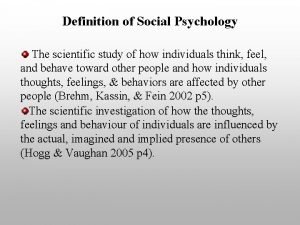Social Psychology The History of Social Psychology Aristotle









- Slides: 9

Social Psychology

The History of Social Psychology Aristotle believed that humans were naturally sociable, a necessity which allows us to live together (an individual centered approach), whilst Plato felt that the state controlled the individual and encouraged social responsibility through social context (a socio-centered approach). Hegel (1770– 1831) introduced the concept that society has inevitable links with the development of the social mind. This led to the idea of a group mind, important in the study of social psychology. Lazarus & Steinthal wrote about Anglo-European influences in 1860. “Volkerpsychologie” emerged, which focused on the idea of a collective mind. It emphasized the notion that personality develops because of cultural and community influences, especially through language, which is both a social product of the community as well as a means of encouraging particular social thought in the individual. Therefore Wundt (1900– 1920) encouraged the methodological study of language and its influence on the social being.

Social Psychology “the scientific field that seeks to understand the nature and causes of individual behavior in social situations. ” (Baron, Byrne & Suls) (1989) -looks at human behavior as influenced by other people and the social context in which this occurs.

Social Psychology is to do with the way these feelings, thoughts, beliefs, intentions and goals are constructed and how such psychological factors, in turn, influence our interactions with others. Social psychologists therefore deal with the factors that lead us to behave in a given way in the presence of others, and look at the conditions under which certain behavior/actions and feelings occur.

The following are just a few of the areas of interest within Social Psychology. Social Cognition A sub-topic of social psychology that focuses on how people process, store, and apply information about other people and social situations. It focuses on the role that cognitive processes play in our social interactions. Attitudes and Attitude Change Psychologists define attitudes as a learned tendency to evaluate things in a certain way.

Violence and Aggression In psychology, the term aggression refers to a range of behaviors that can result in both physical and psychological harm to oneself, other or objects in the environment. The expression of aggression can occur in a number of ways, including verbally, mentally, and physically. Violence-behavior involving physical force intended to hurt, damage, or kill someone or something. Prosocial Behaviors are those intended to help other people. Prosocial behavior is characterized by a concern about the rights, feelings and welfare of other people. Behaviors that can be described as prosocial include feeling empathy and concern for others and behaving in ways to help or benefit other people.

Prejudice and Discrimination Prejudice is a baseless and usually negative attitude toward members of a group. Common features of prejudice include negative feelings, stereotyped beliefs, and a tendency to discriminate against members of the group. While specific definitions of prejudice given by social scientists often differ, most agree that it involves prejudgments (usually negative) about members of a group. Discrimination- is treatment or consideration of, or making a distinction in favor of or against, a person or thing based on the group, class, or category to which that person or thing is perceived to belong to rather than on individual merit. Self and Social Identity Self is the subject of one's own experience of phenomena: perception, emotions, thoughts. Social identity is a person's sense of who they are based on their group membership(s). Tajfel (1979) proposed that the groups (e. g. social class, family, football team etc. ) which people belonged to were an important source of pride and self-esteem.

Group Behavior Group behavior" refers to the ways people behave in large- or small-group situations. People join groups for a multitude of reasons, most frequently because membership satisfies a need of the individual. Group membership can provide companionship, survival and security, affiliation status, power and control, and achievement. There is currently no universal description of what constitutes a group, though research has identified a few common requirements that contribute to recognition of a group. Social Influence Social influence occurs when one's emotions, opinions, or behaviors are affected by others. Social influence takes many forms and can be seen in conformity, socialization, peer pressure, obedience, leadership, persuasion, sales and marketing. Interpersonal Relationships Interpersonal Relationship is a strong, deep, or close association or acquaintance between two or more people that may range in duration from brief to enduring. This association may be based on inference, love, solidarity, regular business interactions, or some other type of social commitment.

THANK YOU. GOD BLESS : )
















